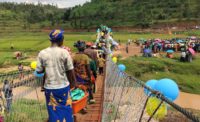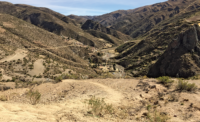Nonprofits
Bridges to Prosperity, Helvetas To Build 150 Footbridges for Ethiopian Communities
Helvetas has already built 100 footbridges in rural Ethiopia. Now, they'll build 150 more with Bridges to Prosperity and a grant from the Helmsley Charitable Trust.
Photo courtesy of Helvetas
An international partnership will help people living in rural Ethiopia gain access hospitals, jobs, schools and markets.
Bridges to Prosperity (B2P), a nonprofit group dedicated to improving rural communities’ access to critical services by building footbridges, is working with Swiss development organization Helvetas to build 150 trail bridges and more than 230 miles of feeder trails in partnership with the Ethiopian government. The program is being funded by a $10-million, three-year grant from the Leona M. and Harry B. Helmsley Charitable Trust.
The groups say nearly 80% of Ethiopia’s population lives in rural areas, and they anticipate more than 1 million people will use these bridges. People living in those rural communities typically must cross the rugged terrain on foot, bicycle or motorbike, and trips often require traveling across gorges or rivers.
In addition to building the infrastructure, B2P and Helvetas hope to help grow the construction ecosystem in Ethiopia by connecting materials, talent and regional road authorities.
Nivi Sharma, CEO of B2P, said in a statement that a collaborative approach including local stakeholders and national officials is needed to create change on the level that the communities need. B2P estimates that thousands of bridges and millions of miles of trail improvements are needed across Ethiopia to connect rural communities to critical services.
“Addressing the challenge of rural isolation in Ethiopia will build a case study of impactful, sustainable collaboration and catalyze the inclusion of rural transport access programs in development strategies worldwide,” Sharma said.
As ENR previously reported, B2P has built pedestrian bridges to improve access to essential services in Latin America and Africa. The Helmsley trust has a history of funding work assisting vulnerable children in sub-Saharan Africa, so it contacted B2P about the impact trail bridges could have around their other work building community resilience and holistic wellbeing for children in Ethiopia, says Alissa Davis, B2P’s director of business development.
“Infrastructure-based projects like these have the power to holistically address so many challenges faced by rural families, ultimately leading to higher participation in the regional labor market and an overall increase in school attendance and the use of health services,” Walter Panzirer, a trustee of the Helmsley trust, said in a statement.
Experienced Builders
Helvetas has worked on similar bridge-building projects. It helped build 5,000 simple suspension footbridges in Nepal. In Ethiopia, it has worked with the government to help build 100 bridges.
Helvetas and B2P have a long relationship, especially sharing design innovations, Davis says. And since Helvetas is already building bridges in Ethiopia and has a strong relationship with the government, B2P suggested collaborating on this project.
“It really is a partnership across all levels,” Davis says. “The role B2P is playing is around assessing the need and then evaluating the impact on the backside once the bridges are built. Helvetas is going to be taking the reins on the actual implementation and delivery of bridges and trail improvements.”
Some details, such as the regions to be targeted first and questions around supply chain work, will be determined at a meeting later this month. Ethiopia is also in the midst of a violent conflict between the government and Tigray People’s Liberation Front. Davis says Helvetas has a safety program in place, and its close work with communities and the local government has helped it build trust and be alerted early if there will be a safety concern in a region where they’re working. Since the program will involve projects in multiple regions, they will have the flexibility to move teams to a region without safety concerns if needed.
Jan Vloet, Helvetas’ country director for Ethiopia, said in a statement that connectivity is essential for these communities to thrive. The bridges they previously built there have already shown the impact transport access can make.
“Year-round access to markets and vital services brings improvements that span generations,” Vloet said.







